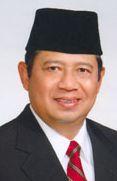
It's a year since SBY became the first directly elected President of Indonesia. The editor-in-chief of the Jakarta Post, Endy M. Bayuni, gives a fair appraisal of SBY's performance so far, rating it 7 out of 10.
For those of you who are unable to read the full article, a word of advice ~ register so you can access the archives I link to.
And now for a balanced extract of Endy's thoughts.
- Here is a president, who, in spite of his landslide 62 percent victory at the polls, knows the limits of his office in the new political landscape where power is shared out.
Elected members of these two institutions owe their allegiances to the electorate or their political parties, and not so much to the President.
Unlike Soeharto, whose word would immediately become law, SBY knew that he faced a tough fight from many powerful detractors, particularly the opposition factions in the House, which are determined in giving him a run for his money.
Every major decision he made had to go through the scrutiny of the House and stand up to other political forces in the country who owe their allegiances to the electorate or their political parties, and not so much to the President.
To complicate matters even further, beginning this year Susilo is losing his clout over the regions. With direct elections for governors and regional chiefs, the elected leaders owe their allegiances to the people first, the political parties that sponsored their election second, and the President a distant third, if at all.
- Critics have called the President indecisive, and been frustrated at his caution in capitalizing on the 62 percent support he won at the polls in September 2004. Anyone else in his place would have done the same, doing the political maths before making the important decisions.
Yet that now gives SBY levers to overcome the occasional intansigence of the DPR, the House of Representatives which, it should be noted, gave its approval for the recent decision to drastically lower the oil subsidy, thus freeing up funds for government expenditure on social welfare, education and other measures to benefit the electorate.
His first year was marked with many events that were beyond his control.
- There was the big earthquake and the devastating tsunami in Aceh in December as well as other smaller natural disasters. There were the outbreaks of polio, thousands of malnourished children, and lately bird flu. In the meantime, world oil prices went through the roof during the year and forced him to hike domestic fuel prices twice. And at the start of this month, terrorists struck again in Bali.
- These took a lot out of the President and his team, at times at the expense of his own agenda, including the fight against corruption, the promotion of governance, and the push for higher economic growth to create more jobs, raise people's income and eradicate poverty.
Perhaps the only bright spot in his presidency was the peace agreement that the government signed with the separatist Free Aceh Movement (GAM) in August which officially ended a 30-year bloody war.
There are still many areas of concern that have not been fully addressed.
- The President's human rights record, for example, is tarnished by his failure to solve the mystery surrounding the murder of human rights campaigner Munir. His approval for the Indonesian Military (TNI) to reactivate its territorial role as part of his war on terror also goes against the spirit eliminating the military's presence in politics.
- Here is a president who shows that he is maturing on the job. One shudders to think how Megawati, or the other three president wannabes for that matter, would have dealt with these seemingly endless crises if they were in charge.





